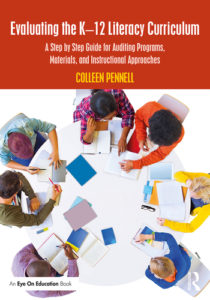How to Audit Your K-12 Literacy Curriculum
Evaluating the K-12 Literacy Curriculum: A Step by Step Guide for Auditing Programs, Materials, and Instructional Approaches
By Colleen Pennell
(Routledge/Eye On Education, 2020 – Learn more)
Reviewed by Abby Markley
 I ended the spring semester of 2020, like most middle school educators, recording YouTube videos from my kitchen table and tracking down students’ assignments via text.
I ended the spring semester of 2020, like most middle school educators, recording YouTube videos from my kitchen table and tracking down students’ assignments via text.
Then, as a newly hired instructional facilitator with elementary responsibilities, I began the fall semester of 2020 with crying teachers in my office. Novice kindergarten teachers were asking me to track down a curriculum I didn’t know existed, and I opened my email each day with one eye closed, hoping our school hadn’t been forced to go entirely online due to the Covid-19 Pandemic.
 While I have my M.A. in English Literature, I didn’t know the first thing about CVC words nor how to help first grade teachers – whose students missed nearly 1/4 of their kindergarten year – teach phoneme blends. I needed a book to help me understand the lower grades literacy curriculum – and fast.
While I have my M.A. in English Literature, I didn’t know the first thing about CVC words nor how to help first grade teachers – whose students missed nearly 1/4 of their kindergarten year – teach phoneme blends. I needed a book to help me understand the lower grades literacy curriculum – and fast.
Though I am far from being ready to lead our teachers through a curriculum audit (that might have to be left for a year when our students and teachers don’t have to remain masked and six feet apart), Evaluating the K-12 Literacy Curriculum: A Step by Step Guide for Auditing Programs, Materials, and Instructional Approaches has served as a great tool for me to quickly build my background knowledge of literacy instruction in the elementary grades.
Tools to use now
One of my favorite parts of the book is found on pages two and three of the introduction. It is a chart that outlines each chapter, its purpose and intended audience, and main topics. With this resource in hand, a newly minted (perhaps in a bit over her head) instructional facilitator was able to go right to the read-aloud section for grades K-3 and build some background knowledge before working with our primary grades virtual teacher as she tries to troubleshoot how to handle read-alouds via Zoom.
Through Colleen Pennell’s practical synthesis of literacy research and pedagogy, I am also able to see how secondary literacy instruction fits into the complex world of K-12 literacy curriculum.
Like many of my secondary colleagues, I was guilty of assuming that my 7th and 8th grade students magically arrived on my classroom doorstep ready to write research papers. This book forces me to examine all the complex steps that are important for taking a kindergartner from first learning how to turn pages in a book to a 12th grade student who truly comprehends what he or she is reading.
Practical resources for post-pandemic audits
When the world has calmed down, and we are ready to audit our school’s literacy curriculum, a number of practical resources in this book will assist me. There are surveys, tools, and score sheets for every phase of the literacy audit as well as step-by-step instructions for me as the audit leader. Opportunities for further reading and explicit directions for when to stop and evaluate specific strategies are also included in each chapter.
I find the section about choosing my audit team especially interesting and well thought out as it includes a suggested calendar for pacing our year-long audit. This chapter highlighted the importance of taking the audit slowly, deliberately, and with purpose and could serve as a tool to force those in my building or district who want to rush into the next great literacy cure-all to make thorough and conscientious decisions.
While this book didn’t keep me up at night with inspirational stories nor impactful narrative case studies, it did deliver exactly as advertised. It is, in fact, a thorough and step-by-step guide for evaluating programs, materials, and instructional approaches.
And it’s that final part of the book that is the most valuable. While teams are auditing programs, they will also be examining current instructional practices. Because if 13 years as an educator have taught me nothing else, they have taught me that there’s no ideal curriculum that will fit every student and every teacher perfectly.
Including instructional practices along with resources
That’s why, as the book so aptly highlights, we as teams must not only audit the resources we’re using but how we’re using them. We owe it to ourselves and our students to carefully examine our instructional practices as part of our audit. While extremely important, this step could be potentially volatile for teachers and teams as they step back to collect data and reflect on what is and isn’t in their classroom instructional toolbox.
However, this book offers a number of ways to defuse potential challenges during hard conversations. Take Chapter 6, “Evaluating Vocabulary Grades K-12,” for example. It begins with an outline of three rubrics that will force teams into non-judgmental data conversations, proceeds to a number of diagrams and visuals to explain different key look-fors in vocabulary instruction and acquisition, and ends with powerful guiding questions for discussions that focus on auditing the teaching practices and materials and not the teacher.
A valuable resource to keep on hand
This book does not need to be read cover to cover by every educator. In fact, in its Introduction it even suggests that it’s not. However, there are certain, clear, direct, and easily accessible chapters that could be powerful for every teacher and administrator in the K-12 education system.
I and anyone else planning to eventually lead teams through a literacy curriculum audit will find ourselves going back to this entire text a number of times because it’s a valuable resource for facilitating teams through an overwhelming yet vital task.
Abby Markley is an instructional facilitator at the University of Wyoming Lab School and has taught 5th grade through undergraduate level students in English/language arts, social studies, and preservice teacher education courses. In her years of public education, she has taught in a number of states and believes all lessons should feature integrated curriculum. She is a doctoral student at the University of Wyoming in the Literacy Curriculum and Instruction program.

































